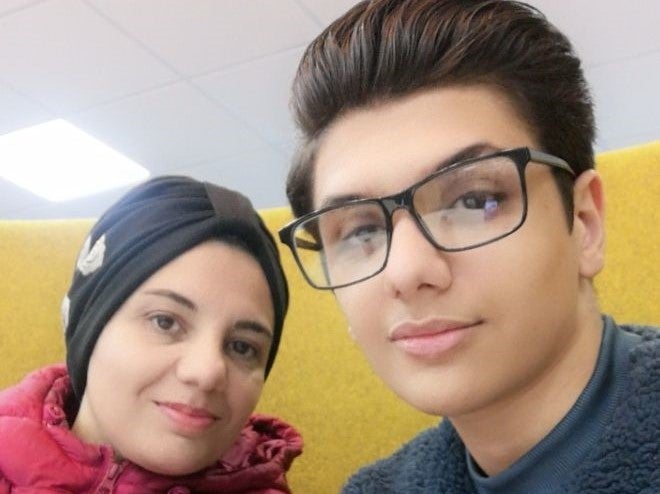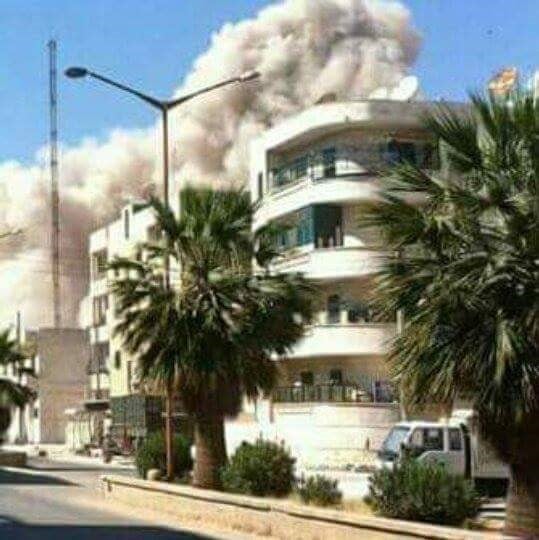‘I can copy her work’: Mother and son who fled Syria begin degree – on same course at same university
They’ll study together, live together - and might even socialise together: Colin Drury speaks to the mother and son tackling university together


Your support helps us to tell the story
From reproductive rights to climate change to Big Tech, The Independent is on the ground when the story is developing. Whether it's investigating the financials of Elon Musk's pro-Trump PAC or producing our latest documentary, 'The A Word', which shines a light on the American women fighting for reproductive rights, we know how important it is to parse out the facts from the messaging.
At such a critical moment in US history, we need reporters on the ground. Your donation allows us to keep sending journalists to speak to both sides of the story.
The Independent is trusted by Americans across the entire political spectrum. And unlike many other quality news outlets, we choose not to lock Americans out of our reporting and analysis with paywalls. We believe quality journalism should be available to everyone, paid for by those who can afford it.
Your support makes all the difference.A mother and son who fled the Syrian civil war in 2015 have both started degrees this week – on the very same course at the very same university.
Manal Rawaeh, 47, and Bilal Batous, 18, are studying biomedical science at Nottingham Trent University, in what is thought to be the only parent and child in the country to be in the same university class.
“Do we sit next to each other in lectures?” says Bilal. “Of course! Her chemistry is very good, so I can copy her work.”
“No, no,” responds Manal. “Bilal’s English is better than mine so, actually, he helps me more than I do him.”
A lot of teenagers might find it a drag being in class with their mother. “Yeah, yes,” laughs Bilal. “At first, I think I need to run from this. But what we have gone through, you realise how important family is; how dependent you are on them.”
I used to visit her [Manal] at the hospital as a kid; I’m a nosy person so I’d be asking what everyone was doing. I found it interesting, you know, helping people through science – this is a great thing
Undoubtedly, the pair have had quite some journey to the labs and lecture halls of Nottingham Trent from their previous home in Idlib – a once-thriving city now devastated by fighting.
They fled in 2015. Up until that point, the war had felt real but distant. Then a shell dropped from a plane destroyed the apartment block next to theirs.
“Terrifying,” remembers Manal, who had worked as a lab technician in a local hospital. “Many dead; 22 people. They had nothing to do with the war but were killed by the government anyway. After that – with children – how can you stay? Four years [the war had been going on] but seeing that… I won’t forget it.”

The family – that’s Manal, Bilal, dad Amjad, a postal worker, and two more sons – crossed the border into Turkey where they lived for a year before being moved to the Gedling area of Nottinghamshire in 2016 under the Syrian resettlement programme.
None of them could speak English at that point but they all took lessons and grafted hard. Within three years, Bilal had passed his GCSEs. Within another two, he’d nailed a Btec in science along with A-Levels in Arabic and Sociology.
Manal, meanwhile, was advised that if she wanted to do lab or hospital work in the UK she would need a degree from a British university to accompany the one she has from the University of Damascus.
And, so, as timing would have it, they both began applying for degree courses at the same time.
Did they mean to end up studying together? Not exactly. Bilal originally planned to go to Manchester but ultimately decided he wanted to stay at home with mum and dad. Partially because of everything the family had been through – “but also, because this means I get to save some money”.
Will they do the most famous of student activities and socialise together?
“If mum’s down for coming to events, I’m down for that, yeah,” says Bilal. “She’s fun to be around. Very cultured. I think she can mix it with younger people.”
He chose biomedicine because he had been inspired by Manal back in Idlib. “I used to visit her at the hospital as a kid,” he says. “I’m a nosy person so I’d be asking what everyone was doing. I found it interesting. You know, helping people through science – this is a great thing.”
It remains unknown exactly how unusual their situation is.
Steve Denton, Nottingham Trent University’s chief operating officer, says he’s never known anything like it there, although a mother and daughter, Diane and Azra Queen, both graduated in criminology and psychology from Coventry University in 2016.
Either way, Manal and Bilal are excited for the next four years. Will there be competition for who gets the best grades? “No, no,” she says. “He is my son and my friend. We both do the best we can.”
Join our commenting forum
Join thought-provoking conversations, follow other Independent readers and see their replies
Comments